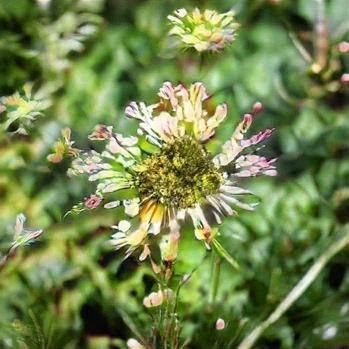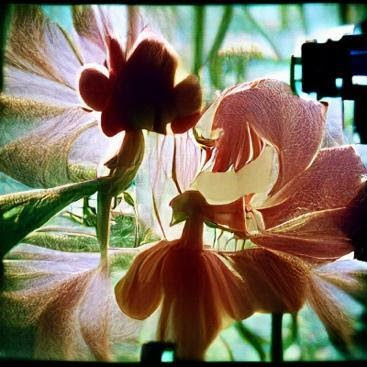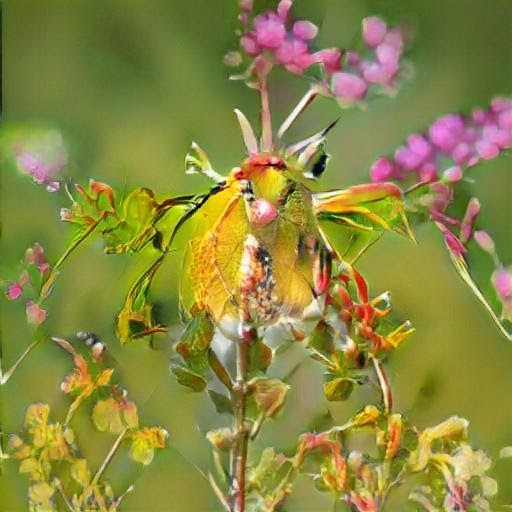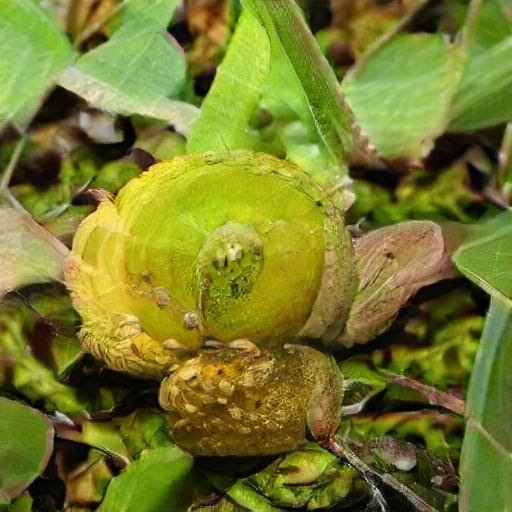
how does kin prepare for an end of one world and the continuance of another?1 how does this multiverse move simultaneously through time? how is one hive’s world much like the other? is it possible for the pollinator to speak for the flower? what kind of neighbour is a figure eight bee? who are the owls that pluck furry bodies? how do they hum for this kin and remember its name? who is this forager that waggles their booty? who is the sun of the bee a structure or suitor? how does kin structure this information: how is kin’s nectar flowing today? how does the pollen curl on the interiors of petals? how does kin remember the daylight will return the next day? will the light return the next day? what is this night that sneezes this hue? what is kin’s point of view? in this meadow, this pastoral of faint pinks and yellow, who will curate this illumination of flowers? who, asks kin. who? who? who? is this a system?

1 I used Artbreeder and NightCafe, AI image generators, to produce these future photographs of plants. These poems are nurtured in response to an ongoing collaboration/conversation on plant-thinking with ELÆ Moss.

future kin love to tell old stories about vases, about captive kin, about a time that gave rise to a loss of sensation and terse friendships.2 once upon time morphs into plants may be considered as persons. a vase, kin say, delegates a shared ancestry between the plucked and a hand. (what is hand? ask kin. Why, the sleep of leaves, which betray the movement.3) it is obvious that in order for human beings to live they must violate plants’ integrity, curtail their flourishing, and ultimately harm them.4 a colony of fingers (what are fingers?) registers a forgetting of root, the soft brush of dirt (why, a tip of the radicle thus endowed…acts like the brain of one of the lower animals5). it is possible to legitimate fugitive emotions, and roses lean on their grey knees.6 a vase is an archive, is now thick with metaphor and fancies. so many generations of flowers roused and mortified. happily ever after morphs into thresholds, cracks in the sidewalk for weeds to flourish, make their refusals known.

2 I give thanks to Elizabeth, Carrie, and Kevin from the Sensing Climate Hope workshop for their fabulous edits and suggestions. I’m extremely grateful. Is this a hopeful poem? What is hope but a series of questions, reaching for possible futures?
3 Charles Darwin, The Power Of Movement In Plants, 1898, Last Updated: December 23, 2018, https://gutenberg.org/files/5605/5605-h/5606-h.htm. Couldn’t you be bolder? What if you had declared: “Plants are intelligent! Look how they move!”
4 Matthew Hall, Plants as Persons: A Philosophical Botany (Albany: SUNY Press, 2011), 111. Should we be judged by the plant or the plant by us?
5 Charles Darwin, The Power Of Movement In Plants. I declare: “Plants are intelligent! Look how they move!”
6 Francis Ponge, Partisan of Things (Chicago: Kenning Editions, 2016), 56. Here Ponge demonstrates his preplanti body, evicting animal biases from his own observations. And here am I: so frustratingly mineral. Look at this body.
7 Ibid.
i. Maureen N. McLane, “Compositionism: Plants, Poetics, Possibilities; or, Two Cheers for Fallacies, Especially Pathetic Ones,” Representations, 140, no. 1 (2017)” 102. Thank you Maureen N. McLane for reminding me of my potential as a pre-plant possibility. Look how I move. Look at this body.

what kin miss about the old forests are the cubicles of scent;8 blood in the sweetness of paper; sugar in the dirt; desk calendars with coffee stains. silk flowers tender the bruising. these days this old debris are colonial in feeling. abhor the light, slow rot bear the residue of blueprints and office chairs. such trees arch their plastic backs in the warm sun. such trees are often wrong, such trees unfurl their fabricated skins like bark; lichen reclaim floral wire for kin’s own. vegetation is indignant of such banalities of communication. the undead distend their petals, litter the ground. together they synthesize new monsters in wiry growth.

8 Joan Maloof, Teaching the Trees: Lessons from the Forest (Athens: University of Georgia Press, 2007), 4.

this flower is really a soft lung, briefly streaked in the throat. leaves reflect their scales of the pyramid like a precious stone. to be honest, not all kin has an idea on how to dismantle the system but assures their peers, “the wind will hold us.” this flower often rejects such assurances to write a poem for mandates and manifestos, or to carry a stern sign to a protest for faculty unions. this flower opposes contingent labour with ambition although ambition flowers precarity. this flower populates a will for change, until it is tenured in suspect meadows. this flower will stand to bloom in the sight of the beauty of the marvels, stiffened with horror.9 there it will reassure its baby peers, “kin hopes the wind will hold us.”

9 Asa Don Dickinson, “Wild Flowers Worth Knowing,” Nature’s Garden, Neltje Blanchan, 1917. Accessed April 12, 2021. https://www.gutenberg.org/files/8866/8866-h/8866-h.htm.

kin form an almost impenetrable lawn in the flower of the mountain for miles. restless by classification, sensitive to the depression of dirt, kin is a child to mud. mud aspires to form, and yields to joyous play. (what kin doesn’t delight in dirt. where there is dirt, there is system.) mud is pigmented, powerful, and spongey, slow to trees, sometimes cruel to seeds that foster the voyages of memory. mud speaks to an admiration of power. kin, however, displays its colours, inside it’s pea-green, a tender spark. inside its flesh is explosive and kind. rich with scent, it forces the nostrils of a passing beast to open. there is a word for its recoil, but in mud, for now, there is no one around to eat it.

10 Asa Don Dickinson, “Wild Flowers Worth Knowing.”
11 Mary Douglas, Purity and Danger: An Analysis of Concepts of Pollution and Taboo, (Routledge, 1966), 36. For Douglas, dirt is an exercise of order and disorder, a structure for power and control. I also wonder if dirt is delight, as ELÆ Moss had challenged me on my original phrasing over Zoom one day. “Wouldn’t (couldn’t) mud aspire to form and delight?” they asked. “Why did you propose that mud is jealous of play?”
12 Ponge, Partisan of Things, 10. It is possible taste the scorn of the orange in Ponge’s poem. Who doesn’t love a citrus fruit that rejects its consumption?